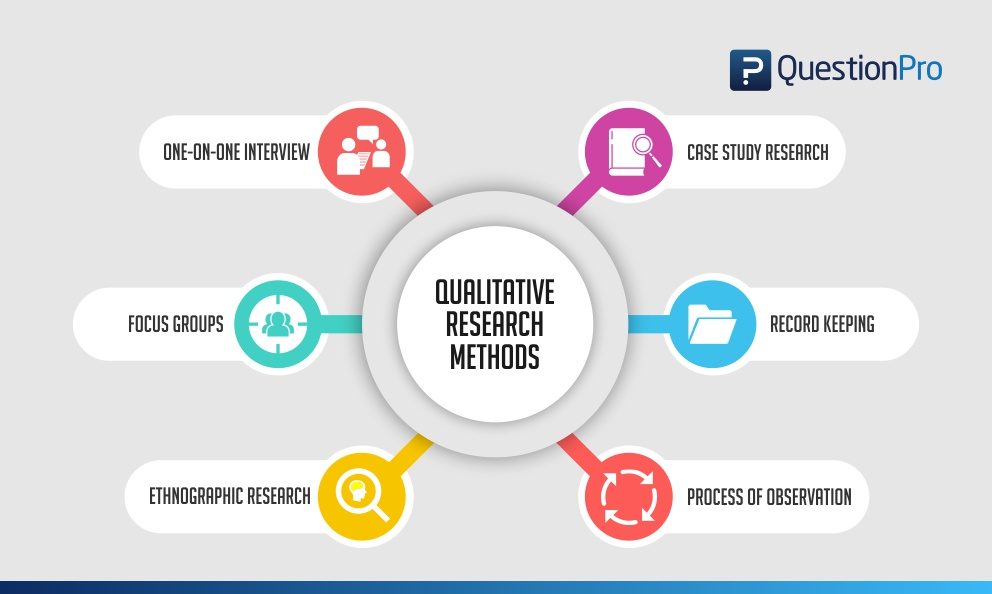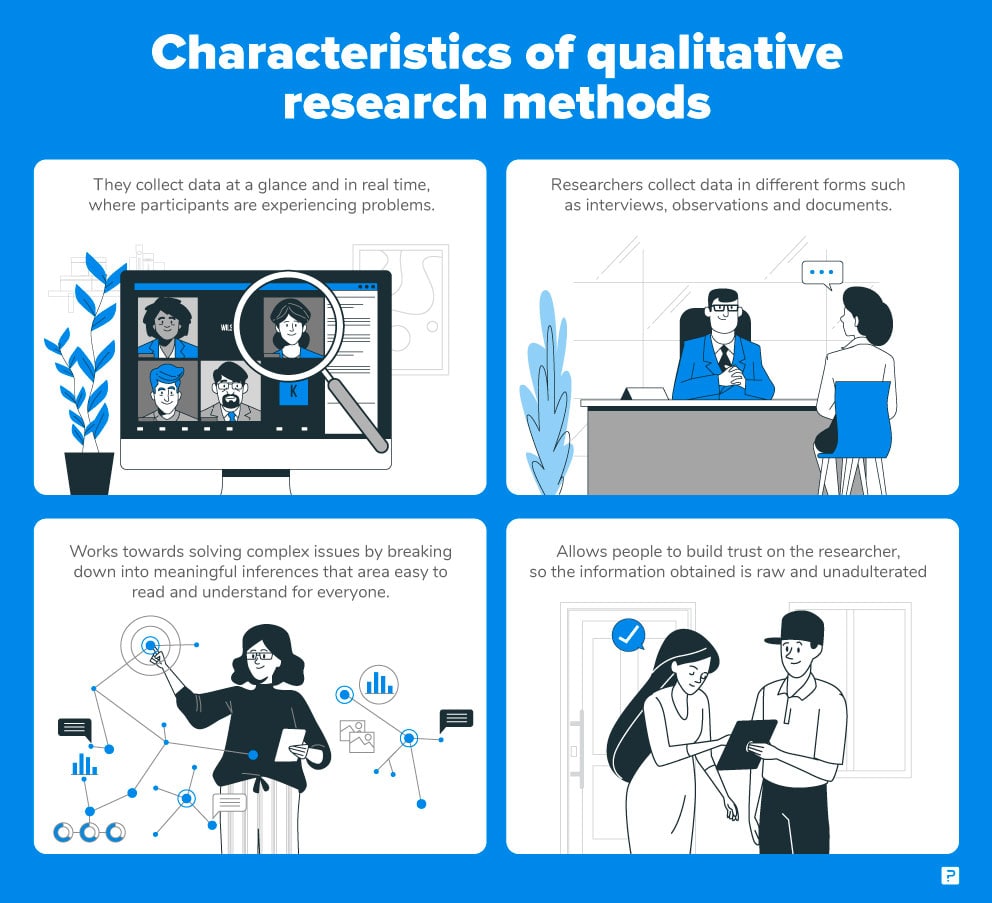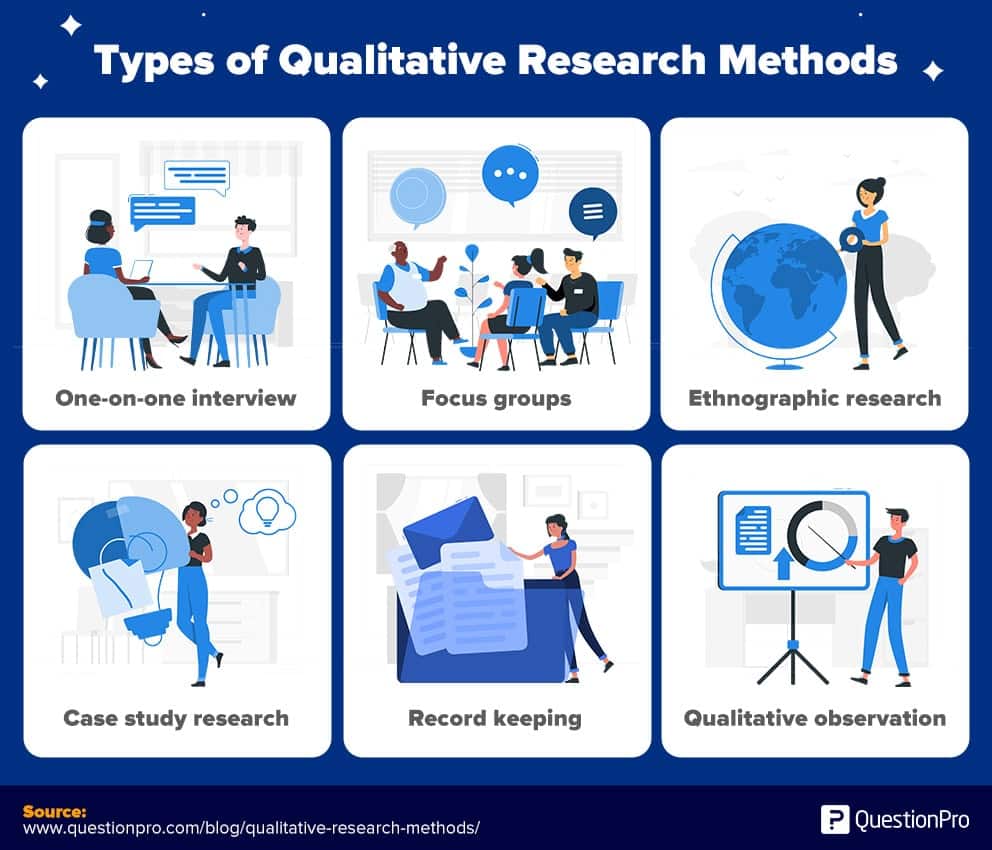
Source (QuestionPro. 22.9.2021)
What is qualitative research?
"Qualitative research is defined as “the study of the nature of phenomena”, including “their quality, different manifestations, the context in which they appear or the perspectives from which they can be perceived”, but excluding “their range, frequency and place in an objectively determined chain of cause and effect” [1]. This formal definition can be complemented with a more pragmatic rule of thumb: qualitative research generally includes data in form of words rather than numbers." Busetto, Wick, & Gumbinger (2020).
Marshall & Rossman (2016, 3).
Qualitative research
Yin (2016, 8.)
Yin (2016, 9.)

Source : Characteristics-of-qualitative-research-methods-min. (QuestionPro. 22.9.2021)
Source Bhandari (2020) An introduction to qualitative research. Scribbr. (22.9.2021).

Source Types of qualitative research. QuestionPro. (22.9.2021).
Figure 1. Empirical material interpretation process. (Rashid, Rashid, Warraich, Sabir & Waseem 2010, 10).
Case Study
"According to Yin (2003) a case study design should be considered when:
(a) the focus of the study is to answer “how” and “why” questions;
(b) you cannot manipulate the behaviour of those involved in the
study;
(c) you want to cover contextual conditions because you believe they are relevant to the phenomenon under study; or
(d) the boundaries are not clear between the phenomenon and context." (Baxter & Jack 2008, 545.)
Developing research Questions
(Baxter & Jack 2008, 546.)
Determining the Type of Case Study
Baxter & Jack 2008, 545-549.
Analysing Data
Bhandri (2021). An intorduction to quantitative research. Scribbr. (24.9.2021).
(Saldaña 2013, 15.)
(Saldaña 2013, 20.)
Using MEMO. Memo writing.
What is an analytic memo?
"Analytic memos are somewhat comparable to researcher journal entries or blogs – a place to “dump your brain” about the participants, phenomenon, or process under investigation by thinking and thus writing and thus thinking even more about them: “Memos are sites of conversation with ourselves about our data” (Clarke, 2005, p. 202).
Think of a code not just as a significant word or phrase you applied to a datum, but as a prompt or trigger for written reflection on the deeper and complex meanings it evokes. The objective is researcher reflexivity on the data corpus, “thinking critically about what you are doing and why, confronting and often challenging your own assumptions, and recognizing the extent to which your thoughts, actions and decisions shape how you research and what you see” (Mason, 2002, p. 5). Coding and analytic memo writing are concurrent qualitative data analytic activities, for there is “a reciprocal relationship between the development of a coding system and the evolution of understanding a phenomenon” (Weston et al., 2001, p. 397)." (Saldaña 2013, 41-42.)
(Saldaña 2013, 50.)
(Saldaña 2013, 53.)
(Saldaña 2013, 59.)
“Generic” coding methods
First Cycle coding methods
1 Attribute Coding (for all data as a management technique)
2 Structural Coding or Holistic Coding (for all data as a “grand tour” overview)
3 Descriptive Coding (for field notes, documents, and artifacts as a detailed inventory of
their contents)
4 In Vivo Coding, Initial Coding, and/or Values Coding (for interview transcripts as a
method of attuning yourself to participant language, perspectives, and worldviews)
Second Cycle coding methods
1 Eclectic Coding (for refining your First Cycle choices)
2 Pattern Coding and/or Focused Coding (for categorization of your coded data as an
initial analytic strategy) (Saldaña 2013, 64.)
Methodology: Away of thinking about and studying social reality
Methods: A set of procedures and techniques for gathering and analyzing data
Coding: The analytic processes through which data are fractured, conceptualized, and integrated to formtheory. (Cabin & Strauss 1998, 3.)
Common Mistakes to Avoid While Writing the Case Study
- "If you choose to write a case study on a shaky premise, it will lead your case study to failure, so just avoid that.
- Don’t ever utilize the old collected data to write in your case study. Always collect fresh and up to date data.
- One of the frequent errors is to present the material in the wrong order.
- If you choose to extract data from other studies, it will result in repetition of data, which could lead your case study to failure.
- Not performing enough research yourself is another common mistake. A few people collect facts after a lot of hard work but fail to make notes, which also lead you to failure at the end.
- Poor language skills or use of inappropriate words to express your ideas and thoughts in case study gives a very bad impression.
- Errors in grammar, punctuation, and syntax are must to avoid as well.
- People start working on the process of how to write a case study
without having a clear path. Understand your aims thoroughly and give
it time as much as it wants. Then execute the entire process to achieve
those aims." (How to Write the Case Study. BohatALA. 29.9.2021)
References
Busetto, L., Wick, W. & Gumbinger, C. (2020). How to use and assess qualitative research methods. (22.9.2021).
Ellinger, A. D. & McWhorter, R. 2016. Qualitative Case Study Research as Empirical Inquiry.
DOI: 10.4018/IJAVET.2016070101 International Journal of Adult Vocational Education and Technology
Volume 7 • Issue 3 • July-September 2016.
Hayes, R. Kyer, B. & Wber, E. (2015). The Case Study Cookbook. (29.9.2021).
Guba, E.G. & Lincoln, Y.L. Competing Pradigsm in Qualitative Research. (24.9.2021).
JSTOR. (23.9.2021). When looking for academic articles, JSTOR is just the place for you!
Lester, J.N., Cho, Y. & Lochmiller, C.R. (2020). Learning to Do Qualitative Data Analysis: A starting Point. Human Resource Development Review 2020. 19(1), 94-106. Sage.
Patricia L. Munhall, Ronald J. Chenai (2008). Qualitative Research Proposals and Reports: A Guide. Google Books.
My Perfect words. Qualitative vs. Quantitative Research - Learning the Basics. (24.9.2021).
(23.9.2021).
Edit
24.9.2021 60/240 min
23.9.2021 180 min
Comments